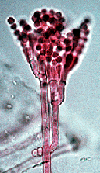
Research in my lab is directed towards: 1) molecular phylogenetics and evolution of sexual and asexual fungi and 2) molecular identification of ericoid mycorrhizal fungi in their natural environment.
1) About 5000 species of fungi produce no known sexual states. Can these asexual fungi be integrated in the same phylogeny with their sexual relatives? Until recently, the answer to this question has been 'no'. Fungal taxa are traditionally delimited by sexual characters. In some cases, the asexual sporulating states of fungi are diagnostic and clearly indicate affinity with sexual species or genera. More often, the relationships of asexual fungi are unknown or confusing because morphologically similar asexual forms are linked to phylogenetically unrelated taxa. We are among the first labs to successfully use DNA sequence data to integrate the fungi with and without sexual states into a common phylogeny.
Asexual fungi pose an evolutionary question. Are these fungi really asexual, or is their sexual reproduction just hard to induce and difficult to observe? How long have fungi been asexual and what factors select for the loss of sexual reproduction? Using population genetic and molecular genetic approaches, we are assessing whether the 'asexual' fungal populations result from clonal or a sexual history. Comparing fungi with and without sex will provide us with an opportunity to evaluate when sex is advantageous in eukaryotes.
2) Which mycorrhizal fungi are important in the natural environment? Morphology provides few clues about the identify of these fungi that live in intimate association with plant roots. In collaborative research with Dr. Shannon Berch, we are developing a DNA sequence and RFLP database enabling us to identify ericoid mycorrhizal fungi in culture and in the field-collected roots. With a combination of molecular and cultural techniques, we are investigating the competitive interaction among these fungi and their distribution in nature.
For additional information, please contact Mary Berbee at
Phone (604) 822-2019 / Fax 822-6089
Patrik Inderbitzin, Ph.D, is now at UC Davis.
Thanks to Ken Wells for the picture of Penicillium.
This page was maintained by Dave Carmean- see
http://www.sfu.ca/biology/qk/
Dr. Mary Berbee
Dept. of Botany
University of British Columbia
#3529-6270 University Blvd.
Vancouver, BC V6T 1Z4
CANADA